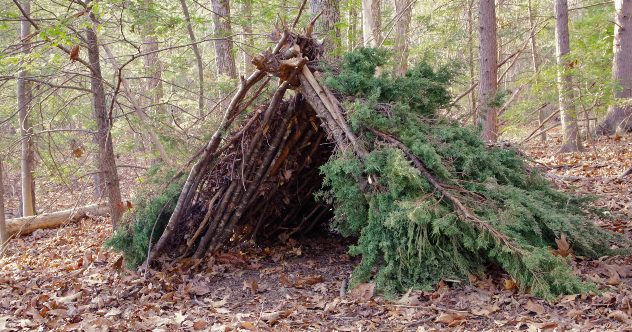[ad_1]

Mistakes are inevitable; our daily actions lead us into conditions that can endanger our lives. Once we find ourselves in difficult situations, the immediate solution is to think of a way to get ourselves out of that mess. However, the challenge is knowing whether our decisions are the right ones.
Let’s explore the ten worst mistakes you can make in survival situations.
Related: 10 Horrifying Stories Of Surviving Nature’s Fury
10 Don’t Underestimate the Risk
We tend to judge situations at face value, which can lead to judging situations incorrectly. We may give a potential issue less attention and expend less energy, but we should shift all our resources to tackle the problem. Underestimating the risk can be one of the worse mistakes you can make.
For example, you might find yourself hiking. You start along the familiar trail, and as a result, you’re confident that nothing bad will happen to you along this route. But any number of things can go wrong. You could trip and break your leg or get lost due to recent rainfall. Without immediate aid, your once-normal hike can become deadly.
We tend to overestimate our capabilities and general safety when comfortable with our surroundings. Yet, we need to think ahead and make a plan for all potential outcomes. Along with our example, it is reasonable to anticipate seeing bears if you are in bear territory while on your hike. Learn how to react to the potential threat by taking the necessary measures, like carrying bear spray and using your senses of smell, vision, and hearing to detect the likely presence of bears.
9 Avoid Drinking Unclean Water
Water is a vital resource that supports life. Many tend to drink any water they can find when faced with thirst. It seems like a survival tactic, but it can be harmful. You risk infecting yourself with a waterborne virus. This survival decision can become a mistake that can significantly cost you your health or life.
You need to know how to purify water when faced with an emergency. Even if the snow or rain looks clean, you always need to clean the water to destroy unseen impurities.
If you have matches and a small saucepan, you can quickly boil snow or another source of fresh water. This will give you peace of mind knowing the liquid you are consuming is not dirty or tainted. Don’t forget to purify additional quantities of fluid for use at a later time.
8 Set Up Camp Early
Another mistake is not giving yourself enough time to make it back to your destination or set up camp before night sets in. If you are fumbling about in the dark, you’re putting yourself in unnecessary danger.
You could unknowingly set up camp right next to a bear’s den or on the edge of a cliff, and you would have no idea!
At about the middle of the day, you should begin looking for a place to set up camp on level ground, protected from the wind, and with an appropriate quantity of fuel and water nearby. First, construct your makeshift shelter, then use the rest of your time to collect enough firewood to keep you warm through the night.
7 Recognize When You’re Lost
When you’re alone and disoriented, it can be hard to admit that you don’t know where you are. When you are in the wilderness, this is a dangerous situation. Some people choose to keep on going and just hope they’ll find the right way. This, however, isn’t always safe.
If you keep going, you risk unintentionally moving farther away from where you hoped to find safety. If a search team is already on the ground searching for you, you may also be moving away from them, which will take the team longer to find you.
The best thing to do is stop once you realize you have no idea where you are. Make a camp and find some ways of signaling in an open clearing where searchers will more readily see you. This will increase the likelihood that you will be found.
6 Know What to Do if a Fire Is Coming Your Way
It is possible to stay alive if a forest fire comes your way. Run. If you sprint through it, you have a greater chance of escaping the flame. Do NOT find a hole or cave to hunker down. You could become trapped with no way out, and the fire could potentially come into the hole or cave. Always run away from the flames. Cover any skin that you can, but especially your breathing passages.
First and foremost, make sure that your eyes, mouth, and nose are protected. Choose a path with the fewest obstacles that leads to an area where the fire will burn with a lower intensity, like a meadow or clearing. Run while keeping your eyes mostly closed, taking a few deep breaths, and you’ll be able to tell when you’ve made it through the ordeal.
Once they reach the flame front, most people scream or attempt to breathe in. Avoid this. Doing so will bring scorching air into your lungs, which will immediately cause your lungs to blister and cause you to drown in your body fluids. Yikes!
5 Stay Calm and Think Warm Thoughts
If you fall through thin ice, you may be tempted to scramble for help. But the first step is to stay calm! Next, don’t shed your heavy winter clothes. Keep your clothes on; they will act as a flotation device and keep your body heat against your body. To get out of the water, turn toward the direction you just came. (This ice was sturdy enough to hold you just a few minutes ago.) Grab onto this thicker section of ice and pull yourself up and out. Lastly, stay flat against the ice, don’t stand up. Your body weight is better distributed when you are flat on the ice.
By this time, hopefully, someone will have called for help and will be able to get you warm. Don’t warm up too quickly, as your body is probably already in shock.
4 Snake Bites, Bite
A snake will inject you with dangerous venom and can easily kill you if the bite is not handled quickly by a specialist. Being bit by a snake can cause you to panic, especially when you don’t know what steps to take. If you make a quick judgment and decide that you have no other option, you may decide to suck out the venom using your mouth or any other instrument you can think of.
However, this is the worst survival mistake you can make. When sucking the bite areas, you cause blood to flow faster and increase the speed of venom in the body. This could mean the venom reaches your heart quicker and causes your death faster.
You need to call an ambulance. A snake bite is life-threatening, and the best measure you should take is to treat this situation as an emergency. Don’t ignore it while assuming that the venom may be less dangerous. You should remain calm and don’t move. If you panic and start running, you will accelerate the spread of venom, which can kill you.
You could apply a pressure immobilization bandage if you received a snake bite on the limbs: leg, feet, or arm. This aims to reduce the spread of venom through your lymphatic system.
3 Jumping Out of a Falling Elevator
When caught in a falling elevator, most people panic. It’s most people’s first reaction, and it will definitely be yours! But try to remember, if you’re ever in that situation, that you should never jump out of a free-falling elevator. It isn’t going to make your landing easier. It could lead to you being paralyzed or dying. Instead, it is best to lay yourself flat and distribute your weight evenly. This raises your chances of survival higher than jumping.
Unfortunately, there is no guarantee of survival, but doing this will help more than hinder.
2 Don’t Hide Under an Overpass During a Tornado Warning
Tornado warnings can happen out of nowhere. You could find yourself driving over a bridge when the alarm occurs. Try to remember this: DO NOT get out of your car and try to hide under the bridge.
Hiding under a bridge will create a wind tunnel effect. This may cause the flying debris that was scooped up by the tornado to be sent directly past you at a speed of at least two hundred miles per hour. Sufficient to say this would be very bad.
You need to find an appropriate shelter. Stick to the general rule, which always recommends that if you receive a tornado warning, go inside if you were outside. If you receive this warning and are at home, you need to go to the basement or ensure you are in a room without a window. You also need to avoid driving after you receive a tornado warning.
1 Tying a Rope Around Your Waist When Falling
Tying a rope around your middle can sound like a good idea to keep yourself from hitting the ground. But consider what the rope could do to your body. The rope would squeeze you when it tightened around you. It can cause significant damage, bruising, or bursting your internal organs and possibly breaking your back.
Always make sure to use a strong harness that attaches to your middle and upper legs if you are rock climbing, and avoid cliffs entirely if you don’t have the proper equipment.
[ad_2]
Source link


